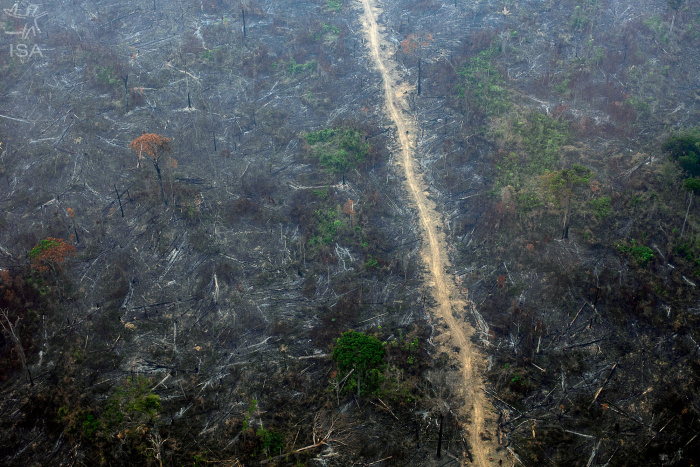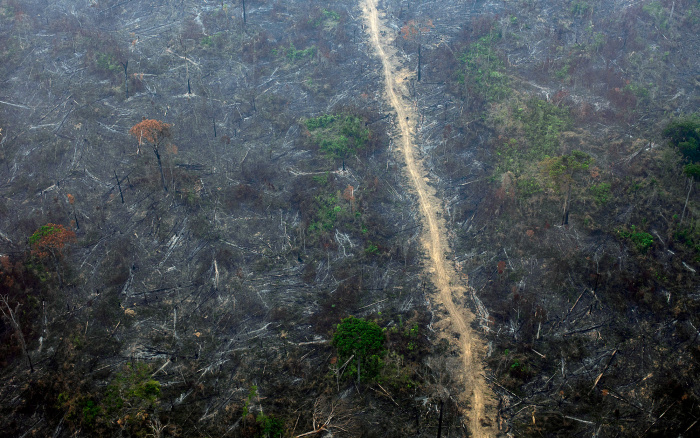Você está na versão anterior do website do ISA
Atenção
Essa é a versão antiga do site do ISA que ficou no ar até março de 2022. As informações institucionais aqui contidas podem estar desatualizadas. Acesse https://www.socioambiental.org para a versão atual.
Even before approval, a land grab draft law is already destroying the Amazon
Thursday, 27 de May de 2021 
The Bolsonaro Effect
Impact on the ground
Esta notícia está associada ao Programa:
An ISA study shows that the expected approval of a draft law granting amnesty to land grabbers has caused a surge in land invasions and deforestation in the world’s largest tropical rainforest
A new study by the Instituto Socioambiental (ISA) has detected an explosive surge of invasions of public lands (known as ‘grilagem’ or land grabs) in the Amazon with a corresponding increase in deforestation in those areas between 2018 and 2020. According to the study, the numbers show the impact of draft laws such as PL 510/2021 and PL 2633/2020, the ‘PLs da grilagem’, which could grant amnesty for recent deforestation and increase expectation of regularization of land invasions. The study also proves a direct relationship between land grabs and the destruction of the Amazon. “Those who deforest end up owning the land”, says Antonio Oviedo, one of the researchers.
The study analysed the Rural Environmental Registry (CAR), which was created by the Forest Code with the aim of integrating environmental information about rural properties and settlements, thus forming a database for environmental and economic control, monitoring and planning, and fighting deforestation. The rural proprietor must make a self-declared registration which is mandatory for the environmental regularization of the property, and must be validated by Brazil’s statal environmental bodies. The problem is that validation can take a long time, and sometimes never happens.
However, an instrument intended for environmental governance has become warped and is now being used by land grabbers who register a public area that does not belong to them to try to prove ‘quiet and peaceful possession’, that is, to try to prove they are in the illegally invaded area and achieve regularization by the Union. Invaders of public lands use this method to attempt to stop other land grabbers from registering the areas beforehand. The land grab becomes consolidated with the illegal possession of lands and deforestation of the area. Cutting down the forest to transform it into pasture is the main instrument used by land grabbers to demonstrate possession.
“Public authorities will use CAR to assess whether there are any environmental irregularities on the property and, if any are found, to compel the proprietor to regularize environmental liabilities. CAR has an environmental purpose, it cannot be used as a land instrument, to prove possession, ownership or the like”, says Juliana Batista, a lawyer with ISA.
With the prospect of approval of laws granting amnesty for land grabbers and regularizing recently deforested areas, the race for land in the Amazon is only increasing. “It has become easier to invade public lands, which has boosted the land market, increasing speculation and making land grabbing even more profitable” Oviedo explains.
There was a 29% increase of the area overlapping CAR records in relation to 2018 in the biome’s non-designated public forests. Deforestation in these areas skyrocketed, almost doubling in the period, increasing by 98% from 185,000 to 367,000 hectares. Total deforestation in the Amazon is following this trend, with 47% growth in the period, an indication that land grabs of public lands is a strong driver of deforestation, and vice versa.
Rural landowners had until 2014 to register their areas with CAR, after which the government would validate and ‘clean’ the system of irregular registrations. But this deadline came to be postponed indefinitely, halting the validation of registrations entirely. “This constant postponement led to the mechanism’s loss of credibility, and CAR became a document used by the land grabbers themselves as proof of their invaded lands. The initial project became completely warped”, says Oviedo. It is important to remember that the invasion of public lands is a crime according to Brazilian law, as is deforestation without a licence or authorisation from the relevant environmental body. As such, all activities practiced by the land grabbers are illegal and criminal, and should be the object of reprimand and not regularization.
In Protected Areas, the situation repeats itself: ISA identified a 56% increase in CAR registrations from within Indigenous Lands and Conservation Units, between the 2018 and 2020 databases of the National Rural Environmental Registration System (SICAR), and a growth of 63% in deforestation in those same areas. Not coincidentally, during the same period total deforestation of protected areas in the Amazon grew by 42%. The approval of state draft laws which reduce protected areas, such as the one approved by the Rondônia Legislative Assembly last month (Supplementary Draft Law 080/2020), which reduces two Conservation Units - the Jaci-Paraná Extractivist Reserve and the Guajará-Mirim State Park - by 200,000 hectares, as well as statements by Jair Bolsonaro indicating that he will not demarcate any Indigenous Lands during his mandate, have encouraged a race for those lands which, according to the Constitution, should be of exclusive usufruct by indigenous peoples and areas of environmental protection.
Federal Conservation Units have been the worst affected by the land grab rush. National Parks and Forests, home to the greatest biodiversity on the planet, are the land grabbers’ main target. In all, CAR registers overlapping those areas have grown by 54%, with deforestation within these irregular registrations growing by 72%. For sustainable use CUs, such as Extractivist Reserves, the increase is greater still - 274% for CAR registrations by third parties within these areas, and a 243% rise in deforestation.
The states of Roraima, Acre and Amazonas are where the protected areas that have most been affected by CAR registration increases are located. In the state of Roraima, the increase of areas with third-party CAR registrations that overlap protected areas was 301% between 2018 and 2020. In the states of Acre and Amazonas, the increase was 153% and 147% respectively. The state of Pará also showed a high increase in third-party CAR registrations overlapping protected areas, totalling over 10 million hectares.
The Bolsonaro Effect
The period analysed gauges the so-called ‘Bolsonaro effect’ on land policy and forest protection in the Amazon, which amounts to a mix of dismantling of environmental enforcement, speaking against the protection of forest peoples and draft laws in the legislature which even before approval are encouraging land grabbers to act without fear of punishment. Since 2019, the federal government has reduced the issuing and charging of environmental fines, slashed the environmental control and enforcement budget, authorised deforestation against technical advice and directed FUNAI prosecutors to halt demarcation of indigenous lands, among others. Pro-deforestation discourse itself and constant criticism of environmental enforcement have caused direct impact in the field. For land grabbers, invading public lands and cutting down the forest with certainty of impunity has become ever more lucrative.
In this scenario, the grilagem draft law is a cover to boost deforestation. One of the most emblematic cases of the proposal is the regularisation of invaded areas up to December 2019. Not only would this grant amnesty to those responsible for the forest fires of 2019 that shocked the world and darkened the skies of São Paulo in broad daylight, it would even grant them possession over the deforested land. This measure would directly conflict with the statement Bolsonaro made during the Climate Summit last week, in which he promised to reduce deforestation in the Amazon to the average rates recorded by the PRODES (INPE) system for the years 2016 to 2020, equivalent to 8,718.6 km², by 2022.
Impact on the ground
There are dozens of cases of crimes being widely documented, but nothing is done by the authorities. In Altamira, a land grabber registered a rural property with a 98.2% overlap with an undesignated public forest. Close to 50% of the area was deforested in May 2020, which is above the limit established by the Forest Code, and nothing was done to stop the crime.
Another case analysed by ISA is about an illegal rural property in Novo Progresso (PA), the region where farmers organised the ‘Day of Fire’ in 2019 and simultaneously set fire to extensive tracts of forest, creating a smoke cloud that reached São Paulo.
The farmer made a CAR registration with a 99% overlap with undesignated public forests. In April 2020, he deforested 87% of the area, almost the entire property. Nearly 2,110 hectares of forest were felled, an inestimable wealth of biodiversity. The area would be capable of holding over 1.5 million trees with a diameter above 10cm. It is public heritage being criminally squandered, encouraged by the very presidency of the Republic.
“The results of this study show the urgent need to suspend and cancel all third-party CAR registrations that overlap with protected areas, including a ban on any new registrations in these territories”, says Oviedo. He concludes that the removal of invaders from protected areas and the strengthening of environmental enforcement bodies is essential to combat these environmental crimes.
Clara Roman
ISA
Imagens:




